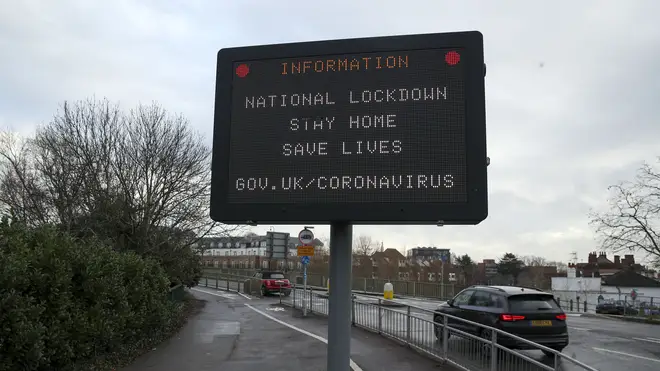
Ali Miraj 12pm - 3pm
6 January 2021, 19:11

MPs have voted to approve regulations enforcing England's new national lockdown by 524 to 16 votes.
Restrictions approved include a stay at home order and the closure of schools to most pupils to tackle rapidly rising coronavirus infection rates.
MPs returned to Westminster to vote on the regulations enforcing England's national lockdown today as the stringent restrictions entered into force on Monday amid spiralling coronavirus cases.
The Commons has been recalled from its Christmas recess for the second time, to debate and retrospectively vote on the measures announced by the Prime Minister on Monday.
The vote comes amid the news that an estimated 1 in 50 people had Covid-19 last week - rising to 1 in 30 in London.
1.3 million people have so far been vaccinated against the virus, Boris Johnson said yesterday. However, the UK recorded 62,322 new Covid cases - highest daily rise ever - and 1,041 more deaths on Wednesday.

Boris Johnson outlines why lockdown legislation runs until 31st March
Mr Johnson addressed MPs earlier on Wednesday, saying he had no choice but to impose another lockdown.
The Prime Minister told MPs people must stay at home to give those administering the Covid-19 vaccine a "head start" over the virus.
Mr Johnson said tougher restrictions were necessary to combat the new variant first seen in the UK and that there was now "no choice" but to put England back into a nationwide lockdown.
"The Tiers, that the House agreed last month, were working with the old variant, but alas this mutation - spreading with frightening ease and speed in spite of the sterling work of the British public - this mutation has led to more cases than we've seen ever before," the prime minister said.
He added: "And so we have no choice but to return to a national lockdown in England with similar measures being adopted by the devolved administrations, so we can control this new variant until we can take the most likely victims out of its path with vaccines."

Sir Keir Starmer lambasts PM over UK's Covid situation
Labour also supported the motion, with leader Sir Keir Starmer calling the restrictions "necessary".
Prior to the vote, he told MPs: "The situation we face is clearly very serious, perhaps the darkest moment of the pandemic.
"The virus is out of control, over a million people in England now have Covid, the number of hospital admissions is rising, tragically so are the numbers of people dying.
"And it's only the early days of January and the NHS is under huge strain. In those circumstances, tougher restrictions are necessary.
"We will support them, we will vote for them and urge everybody to comply with the new rules - stay at home, protect the NHS, save lives."
And in a televised address to the nation on Tuesday, Sir Keir threw his support behind the new tough Covid measures for England, saying his party will "support the lockdown, vote for it in Parliament and join in this national effort."
He also urged the government to use the lockdown to "deliver millions of vaccine doses a week by the end of the month in every village and town, every high street and every GP surgery."

Boris Johnson announces third Covid lockdown for England
During the debate, Health Secretary Matt Hancock told MPs he does not expect regulations enabling a national lockdown to be fully in place until the end of March.
Conservative Sir Graham Brady, chairman of the party's backbench 1922 Committee, asked in the Commons: "Approving these regulations today would allow for lockdown for three months until the end of March."
Sir Graham said Prime Minister Boris Johnson had assured him he did not expect MPs to have to "wait that long" for an opportunity to decide whether or not to end the regulations.
Sir Graham added: "Will he go further and give a commitment to a further vote at the end of January and end of February, so this House will have control over what is happening?"
Mr Hancock replied: "While these regulations do provide for new restrictions until the end of March, it is not because we expect the full national lockdown to continue until then but to allow the steady, controlled and evidence-led move down through the tiers on a local basis.
"Those tier changes do require a vote in Parliament. The restrictions will therefore be kept under continuous review, there's a statutory requirement to review every two weeks and a legal obligation to remove them if they're no longer deemed necessary to limit the transmission of the virus."

Williamson: Teachers will assess grades for A-Level and GCSE's
It comes amid the news that teacher assessed grades will be used for GCSE and A-Level results this summer after exams were cancelled.
Education Secretary Gavin WIlliamson confirmed that teacher assessments will replace the traditional exams, unlike last year, where a much maligned algorithm was used to decide grades.
Mr Williamson told the House of Commons: "I can confirm now that I wish to use a form of teacher assessed grades with training and support provided to ensure these are awarded fairly and consistently across the country."
It is the second year running that GCSEs and A-Levels have been scrapped because of the coronavirus pandemic.
The Education Secretary said he expected schools to provide between three and five hours teaching a day, depending on the child's age, and said: "If parents feel their child's school is not providing suitable remote education they should first raise their concerns with the teacher or headteacher and, failing that, report the matter to Ofsted."